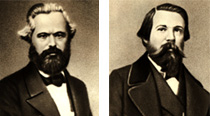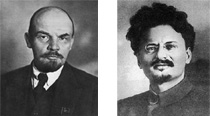The article below may be copied and circulated but proper attribution of authorship is required.
Copyright: Iskra Research; By F. Kreisel, May 12, 1997
The human cost of Russian capitalism
First a few dry numbers:
In 1989 there were 2.2 million live births in the Russian Federation, then a part of the Soviet Union, and 1.4 million deaths. In 1995 1.4 million babies were born, and 2.2 million persons died in capitalist Russia. Average life expectancy has plunged, epidemics of preventable communicable diseases spread and the public health system continues to collapse. A Reuters report, dated May 6, 1997, about Dulyapino, a small textile town in the Nizny Novgorod region painted a grim picture of a doomed factory, unemployed population of former textile workers, now trying to survive by growing potatoes and other vegetables on their small plots of land. The report described the mood of the population as that of quiet desperation. This hamlet of two thousand people produced only three babies last year, but 43 persons died. An even grimmer report was published in the "Financial Times" on May 10th, 1997. Entitled "Hostages to town and country" it described the life in the town of Krasnouralsk, home to one of Russia's largest, and still working, copper smelters. The town's 33,000 residents face a grim choice: to continue running the polluting smelter means to infect their kids with all manner of disease, including mental retardation. But there are no alternative places of employment, no other way to put bread and potatoes on the table. Here is an excerpt from this report:
"Even from a health standpoint, economic survival is the necessary priority. The young charges at Children's Kombinat Number 7, the town's most elite nursery school, eat fruit only one day a month and drink just one full glass of milk a day. Their daily juice break has been cancelled because the nursery cannot afford to buy the offerings on sale at local stores.
"Their teachers, who say each year's class is more feeble than the last, cannot say whether it is the pollution or the poor living conditions which are taking a tougher toll on the children. "People are getting more and more sick every year," Rima Yermakova, the nursery headmistress, explains. "We do what we can, but sickness is growing. People do not have money for medicine and less money for food."
The human balance of capitalist restoration in Russia: 800,000 persons more die each year, who would have lived under the old regime; 800,000 babies per year would have been born, but won't be. The readers should understand that the old regime was neither socialist nor communist, and as anyone acquainted with Trotsky's writings on the USSR is aware, the Soviet Union was very far from a workers' paradise. Capitalist Russia, however, will be hell on Earth for the majority of its people. But the news is not all bad: Today's reports from the Moscow stock market tell us that
"Russian shares ended two months in the doldrums, breaking index and individual records" and there is jubilation both in Moscow and on Wall Street as " the RTS 22-share index gained 6.9 percent to close at a record 360.72".




